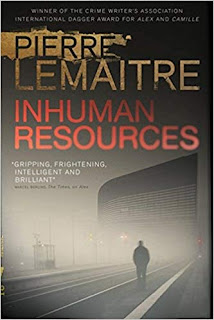Inhuman Resources by Pierre Lemaitre
Alain Delambre is a 57-year-old former HR executive who has been out of work for four years. He started out hopeful of returning to a suitable job, but the years have taken their toll as only menial jobs present themselves and he is faced with daily reminders of the life he once had in the faces of his wife and adult daughters and all around his not-quite-paid-off apartment. When he is called in for an HR position at a major company, Alain prepares for the interview as if his life depended on it. He risks everything in his preparation, risks his family’s scorn, and agrees to participate in a mock hostage scenario as part of the interview, certain that it will all be worth it once the job is his. When Alain realizes the odds have been stacked against him, he envisions his future crashing around him and what should have been a role-playing game takes on deadly overtones.
Pierre Lemaitre has created a standout novel with characters that earn your sympathy even as you cringe at their actions. Lemaitre spins the story out slowly and lets you fully inhabit the world of the characters before the main events spring into action. He lets you feel the weight of what a lengthy term of unemployment does to you, especially in a country with high unemployment. This, in turn, makes it easier to understand the lengths to which someone might go to restore the sense of self-worth they feel holding a job in their chosen field. Even as you understand that wrong decisions are being made, you can empathize with why one might make them, and how each bad decision leads to the next. You feel the whirlpool of events pulling down on the character and share the sense of inescapability.
Lemaitre tells the story in a linear fashion, but with twists and turns that keep you off balance. His characters are richly described and his descriptive powers bring both the physical locations to life as well as the emotional state of the characters. It reminds me in some ways of a cross between a Hitchcock film and Breaking Bad. Delambre views his own actions through a moral kaleidoscope which is constantly shifting and adjusting to a new normal.
Lemaitre does something unique with the character of Alain Delambre. He tells his story (mostly) from Delambre’s point of view, but he simultaneously lets you view things through Alain’s eyes and also lets you view the situation with greater clarity than Delambre ever achieves. This is a remarkable accomplishment. It gives the reader a greater sense of the unfolding and resulting tragedy than the character ever realizes. This more than anything else elevates the book from merely a great suspense thriller to one of the best books of the year.
I received a copy of this book from the publisher.
Buy it here:


Pierre Lemaitre has created a standout novel with characters that earn your sympathy even as you cringe at their actions. Lemaitre spins the story out slowly and lets you fully inhabit the world of the characters before the main events spring into action. He lets you feel the weight of what a lengthy term of unemployment does to you, especially in a country with high unemployment. This, in turn, makes it easier to understand the lengths to which someone might go to restore the sense of self-worth they feel holding a job in their chosen field. Even as you understand that wrong decisions are being made, you can empathize with why one might make them, and how each bad decision leads to the next. You feel the whirlpool of events pulling down on the character and share the sense of inescapability.
Lemaitre tells the story in a linear fashion, but with twists and turns that keep you off balance. His characters are richly described and his descriptive powers bring both the physical locations to life as well as the emotional state of the characters. It reminds me in some ways of a cross between a Hitchcock film and Breaking Bad. Delambre views his own actions through a moral kaleidoscope which is constantly shifting and adjusting to a new normal.
Lemaitre does something unique with the character of Alain Delambre. He tells his story (mostly) from Delambre’s point of view, but he simultaneously lets you view things through Alain’s eyes and also lets you view the situation with greater clarity than Delambre ever achieves. This is a remarkable accomplishment. It gives the reader a greater sense of the unfolding and resulting tragedy than the character ever realizes. This more than anything else elevates the book from merely a great suspense thriller to one of the best books of the year.
I received a copy of this book from the publisher.
Buy it here:




Comments
Post a Comment